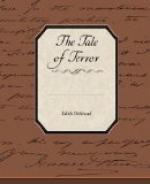Captain Marryat, whose mind was well stored with sailors’ yarns, retells in The Phantom Ship (1839) the old legend of the Flying Dutchman. At one time the doomed vessel is an unsubstantial vision, which can pass clean through the Utrecht; at another she is a real craft, whose deck can be boarded by mortal men. The one-eyed pilot, Schriften, with his malignant hatred of the hero, Philip, is a terrifying figure. The story is embroidered by the invention of a wife of Arab extraction, who is constantly attempting to recall the half-forgotten magical arts which her mother had practised. Marryat makes an opportunity in the history of Krantz, the second mate of the Vrou Katerina, to introduce the Scandinavian legend of the werewolf, which is related with grisly detail.
The novel of terror, with all its faults, had seldom been guilty of demanding intellectual strain or of overburdening itself with erudition. It was the dignified task of Lord Lytton to rationalise and elevate the novel of terror, to evolve the “man of reason” from the “child of nature.” Although time has tarnished the brilliance of his reputation, George Edward Bulwer was an imposing figure in the history of nineteenth century fiction. Throughout his life, in spite of political and social distractions and of matrimonial disaster, he continued to engage with unwearying industry in literary work. He was not a man of genius in whom the creative impulse found its own expression, but a versatile and accomplished gentleman who could direct his talents into any channel he pleased. Essays, translations, verses, plays, novels flowed from his pen in rapid succession, and he won his meed of applause and fame, as well as his share of execration and derision, in his own lifetime. Quick to discern the popular taste of the hour, and eager to gratify it, Lytton, with the resourceful agility of a lightning impersonator, turns in his novels from Wertherism to dandyism, from criminal psychology to fairy folk-lore, from historical romance to domestic romance, from pseudo-philosophic occultism to pseudo-scientific fantasy. He ranges at will in the past, the present or the future, consorting indifferently with impalpable wraiths, Vrilya or mysterious Sages. It is to his credit that this unusual gift of adaptability does not result in incompetency. Though he attempts a variety of manners, it must in justice be acknowledged that he does most of them well. He constructs his plots with laborious art, and pays a deliberate, if sometimes misguided, attention to style. When he fails, it is less from lack of effort than from over-elaboration and excess of zeal.




